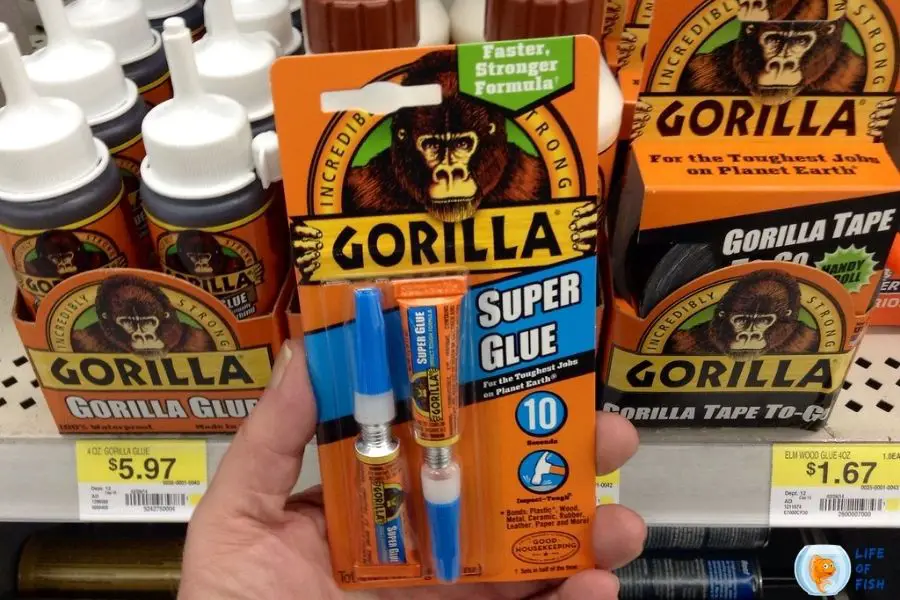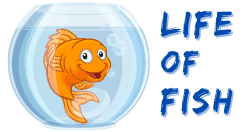Gorilla glue is a well-known adhesive we use in various DIY projects. As adhesive contains substances that can be toxic to plants and animals, everybody would hesitate to use a certain kind of glue in plants and aquariums. But fortunately, there is safe glue that can be used in plants and aquariums.
Is gorilla glue safe for plants? Yes. But you have to check the ingredients of your glue first as the Gorilla brand has different types of glue in the market.
So, how do we know if Gorilla glue is safe for such circumstances? Let’s find out more about this in this article.

What is gorilla glue?
Jump To
- 1 What is gorilla glue?
- 2 Is gorilla glue safe for plants?
- 3 Gorilla glue for aquariums
- 4 Is Gorilla Glue super glue?
- 5 Is Gorilla Glue toxic when dry?
- 6 Which is stronger, Gorilla Glue or epoxy?
- 7 What can Gorilla Glue be used on?
- 8 What is the curing time for Gorilla Glue?
- 9 What are the warnings for Gorilla Glue?
- 10 What is the shelf life of Gorilla glue?
- 11 What kind of glue is safe for aquarium plants?
- 12 Can you super glue plants underwater?
- 13 Conclusion
Gorilla glue is a kind of adhesive that can be used in various projects. The main product of this company contains polyurethane as the main ingredient.
However, some products such as Gorilla super glue and Gorilla super glue gel contains cyanoacrylate as the main ingredient.
These products are very popular among people for their strong adhesive properties. They are used in various DIY projects such as household furniture, countertops, cabinets, drawers, and closets. Some homeowners also use it for gluing tiles on the wall or floors.
Others use it for home décors, such as wall clocks and jewelry boxes. At the same time, some people use Gorilla glue to fix broken cups, plates, and glasses.
Is gorilla glue safe for plants?
Gorilla glue is safe for plants if the product’s main ingredient is cyanoacrylate. However, if the gorilla glue contains polyurethane as the main ingredient, it is not safe for plants and aquariums.
Polyurethane contains substances that are poisonous to aquatic organisms. Exposing these creatures to this substance can kill them.
So, it is not advisable for aquarium enthusiasts to use gorilla glue as adhesive because it has polyurethane as the main ingredient.
But, if you use Gorilla super glue or Gorilla super glue gel, then it is safe for use in aquariums and plants.
These products contain Ethyl cyanoacrylate as the main ingredient. Ethyl cyanoacrylate is a type of cyanoacrylate that is not as toxic to aquatic organisms as the other types, such as n-butyl and octyl.
What is cyanoacrylate?
Cyanoacrylate is a kind of adhesive with low toxicity. You can use it safely in household projects or gardening without worrying about your plant’s health.
Homeowners use this product for vinyl flooring, wall tiles, windows, or even cabinets. You can also use this adhesive in crafts such as scrapbooks, wreaths, and picture frames.
Aquarium experts use it for making artificial plants. It is also safe in gluing driftwood and rocks in the tank.
Gorilla glue for aquariums
As per Gorilla glue’s official page, any of their products are not recommended for aquarium use.
But, this statement needs further clarification because many aquarists have had success using Gorilla Super Glue in their aquariums without any harmful effects.
This is because any Cyanoacrylate-based adhesive is safe to use in plants and aquariums. However, there are safety precautions we must take before using it in aquariums. First, You MUST use ONLY Gorilla Super Glue or Gorilla Super Glue Gel in aquariums.
Is gorilla glue safe for fish?
Gorilla glue is safe for fish if it is completely cured before putting the glued object into the aquarium.
Although this product takes seconds to make a strong bond, it takes about 24 hours for the ingredients to cure. Once cured, Gorilla glue becomes inert and fume-free, so it is safe for aquarium fish.
Is gorilla glue safe for aquarium plants?
Yes. Gorilla glue is safe for aquarium plants, even if they are sensitive to other adhesives due to its cyanoacrylate element.
This type of cyanoacrylate (Ethyl cyanoacrylate) is not as toxic to aquatic creatures as its other variants, such as octyl and butyl-based cyanoacrylate.
So, gorilla glue is safe for plants and aquariums as long as it is curing and not used in the tank.
But, beware, you must use the glue after the plant is removed from the tank, and you should let it cure for a day before putting the plant back.
Does Gorilla Glue leach into water?
Any Gorilla product will leech into the water if put into the water before curing. So, it is advised not to put any glued object until after 24 hours.
It takes about 24 hours for Gorilla glue to cure completely. Once cured, it will become inert and will not leech into the water for a long time.
However, there are reports that Gorilla glue has leeched into the water when attaching rocks or driftwood in aquariums.
Is Gorilla Glue super glue?
Gorilla glue, precisely Gorilla super glue, is an alternative to Super Glue sold by Original Super Glue Corporation.
However, super glue has two more ingredients than Gorilla glue to make the bond faster, Polymethyl methacrylate and Hydroquinone.
Gorilla glue has only Ethyl cyanoacrylate in their product. Although Super glue bonds faster than Gorilla glue, Gorilla glue is much safer for aquarium use based on the ingredients they use.
Is Gorilla Glue toxic when dry?
No. Gorilla glue becomes inert, which means no fume or toxicity is emitted when it is dry. It is also safe for plants and aquariums if the glue has cured and is not in contact with water.
So it is safe for plants and aquariums once the glue has cured, but not when it’s still wet after 24 hours.
Which is stronger, Gorilla Glue or epoxy?
Although Gorilla glue is a strong adhesive, epoxy is better than Gorilla glue because it can bond stronger and can last much longer.
Unlike Gorilla glue that sticks to the object’s surface, epoxy penetrates deeper into the surface, making a stronger bond.
Also, epoxy can bond well with more materials than Gorilla glue, while Gorilla glue has limits to what it can bond with.
So, Gorilla glue is suitable for temporary use, and epoxy is better for projects that require a lasting bond.
What can Gorilla Glue be used on?
You can use Gorilla glue to bond many things, including glass, ceramic, metal, stone, and concrete. It is also suitable for attaching wood to the other materials mentioned above.
Gorilla glue is also safe for aquarium objects such as wood and coral but not in direct contact with water until it has cured completely.
Can you use Gorilla Glue on porous surfaces?
Yes, you can use Gorilla Glue to glue porous surfaces such as cork and bamboo.
This is because the glue reforms back into its porosity. But, there are some porous objects that Gorilla glue cannot bond with, such as rubber and leather.
Does gorilla glue work on metal?
Yes, Gorilla glue works very well with metal. But, you should not use it for unattended projects because the bond takes a long time to cure.
Also, you should test a small area in an inconspicuous place before using the glue on the entire surface to ensure that it does not react with the metal.
Does Gorilla glue work on plastic?
Yes, Gorilla glue works very well with plastic as long as it is not polypropylene (PP) or polyethylene (PE) plastics. Gorilla glue does not stick well with these materials and may soften it.
What is the curing time for Gorilla Glue?
The curing time for Gorilla glue is dependent on the temperature. If it is hot, it takes much less time to cure than if it is cold.
It can also take longer if the glue is exposed to water before curing, so avoid application on wet surfaces. After 24 hours, gorilla glue is completely cured.
What are the warnings for Gorilla Glue?
Gorilla glue can emit fumes when curing because it is made of cyanoacrylate. It can also irritate eyes and skin if exposed to the glue.
If you are working with the product, you should wear protective clothing and safety glasses.
However, Gorilla glue is not toxic even if exposed to skin or eyes. It may leave a strong bond that can be difficult to break through weak solvents such as nail polish remover.
What is the shelf life of Gorilla glue?
The shelf life of gorilla glue is at least three years. However, the shelf life can decrease if kept in an aquarium.
What kind of glue is safe for aquarium plants?
Other than Gorilla glue, many other types of adhesives are safe for aquarium plants.
You can use silicone sealer, aquarium tank epoxy, super glue, and hot glue to fix aquarium plants. Some of them are non-toxic to fish and safe for contact with water.
So, Gorilla glue isn’t the only type of glue safe for aquariums. Many others can be used to fix aquarium plants, so feel free to use whichever one you feel most comfortable with.
Can you super glue plants underwater?
Although many aquarists have had success gluing plants underwater with superglue without much effect on their fish, this is not advised.
Many manufacturers have claimed that their glues are safe for aquarium plants and fish when it is dry but not underwater.
The superglue chemicals are soluble in water, so that the glue may dissolve into the water and harm fish.
Conclusion
Gorilla glue is non-toxic to plants and fish if the product’s main ingredient is cyanoacrylate.
Always make sure to check the ingredients list on the Gorilla glue before buying it, as some variants of this popular adhesive contain polyurethane and are not safe for plants or aquariums.
Stick with cyanoacrylate-based Gorilla glues such as Superglue and Superglue gel for your bonding needs in your aquarium.
Read Next : Is Hot Glue Toxic To Turtles? (No, But You Should Know This) Is Krazy Glue Safe For Aquariums ? | A Crazy Answer For You | Is Epoxy Glue Safe For Aquariums ? (2 Part Epoxy Aquarium Safe)
